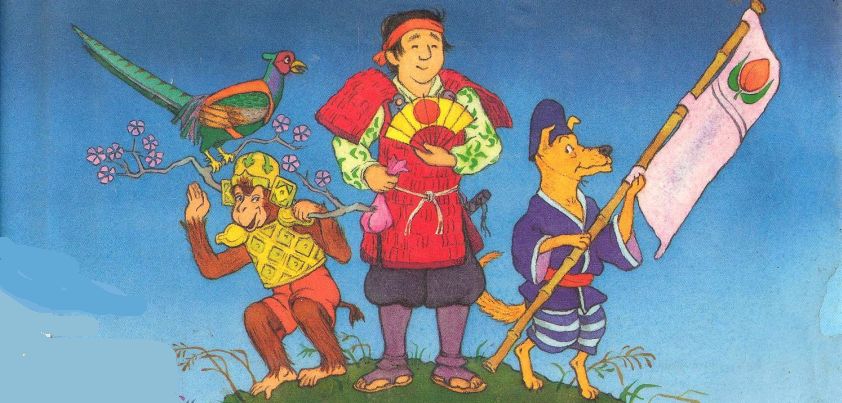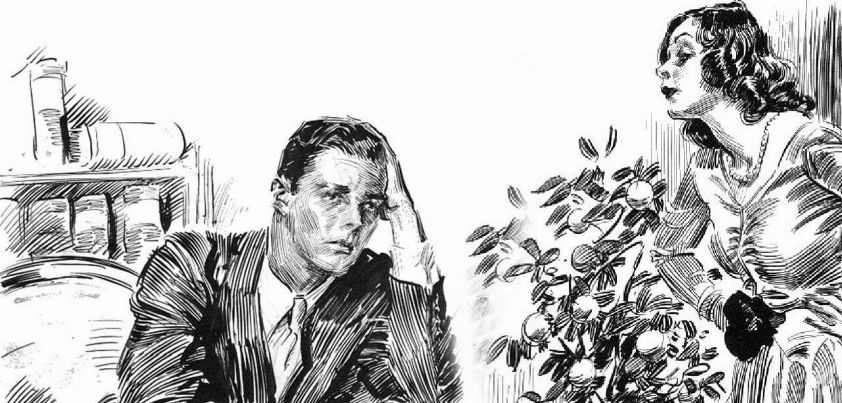 In this famous Japanese folktale, a childless couple’s prayers are answered when a giant peach splits open to reveal a baby boy. The boy grows up to be the strongest and wisest lad in the land and, at fifteen, decides to give his poor parents an easier life by traveling to an island off the Northeast coast of Japan, destroying a band of cannibalistic demons that are terrorizing the land, and bringing back their treasure. Along the way he gathers troupe of anthropomorphic animal friends who, in predictable folktale form, help him easily win the day. More…
In this famous Japanese folktale, a childless couple’s prayers are answered when a giant peach splits open to reveal a baby boy. The boy grows up to be the strongest and wisest lad in the land and, at fifteen, decides to give his poor parents an easier life by traveling to an island off the Northeast coast of Japan, destroying a band of cannibalistic demons that are terrorizing the land, and bringing back their treasure. Along the way he gathers troupe of anthropomorphic animal friends who, in predictable folktale form, help him easily win the day. More…
All posts by shortsonline
The Toxic Donut
 In this story by Terry Bisson, a woman has been nominated from entries all over the world to represent humanity in an annual TV extravaganza. The focus of the show, set in the future and officiated over by world leaders, is Environmental Awareness. One of its features is a “Wonders of Science” film segment celebrating technology that can concentrate a whole year’s toxic wastes and pollutants into a single donut. In the finale, the donut for the previous year is presented to the world. The unwitting woman’s role is to eat it. Themes include environmentalism, science and technology, human sacrifice. More…
In this story by Terry Bisson, a woman has been nominated from entries all over the world to represent humanity in an annual TV extravaganza. The focus of the show, set in the future and officiated over by world leaders, is Environmental Awareness. One of its features is a “Wonders of Science” film segment celebrating technology that can concentrate a whole year’s toxic wastes and pollutants into a single donut. In the finale, the donut for the previous year is presented to the world. The unwitting woman’s role is to eat it. Themes include environmentalism, science and technology, human sacrifice. More…
Testimony of Pilot
 This powerful story by Barry Hannah follows the journey of a boy and several companions from youthful pranks to high school band competitions, musical success, fulfilling careers and, in two cases, premature death. Set between the mid-1950s and the late-1960s, the story highlights several aspects of the American South’s small-town culture of the day: family wholesomeness, racial segregation, the sexual revolution, the rise of rock and roll, and the Vietnam War. Themes include the transformative power of music, friendship and rivalry, sexuality, gender roles, misogyny, racism, isolation, patriotism, and social change. More…
This powerful story by Barry Hannah follows the journey of a boy and several companions from youthful pranks to high school band competitions, musical success, fulfilling careers and, in two cases, premature death. Set between the mid-1950s and the late-1960s, the story highlights several aspects of the American South’s small-town culture of the day: family wholesomeness, racial segregation, the sexual revolution, the rise of rock and roll, and the Vietnam War. Themes include the transformative power of music, friendship and rivalry, sexuality, gender roles, misogyny, racism, isolation, patriotism, and social change. More…
You Were Perfectly Fine
 This entertaining “morning after” story by Dorothy Parker describes an embarrassed young man’s reactions as he tries to piece together what happened the night before. The beauty of the story is that, depending on how the reader interprets the dialogue, it can be taken several ways. One is that the woman is exaggerating or even making up events to teach the man a lesson. Another is that the events are true but she is playing them down because she wants to believe something he said during the cab ride home. Themes include alcohol abuse, memory, relationships, guilt, happiness and regret. More…
This entertaining “morning after” story by Dorothy Parker describes an embarrassed young man’s reactions as he tries to piece together what happened the night before. The beauty of the story is that, depending on how the reader interprets the dialogue, it can be taken several ways. One is that the woman is exaggerating or even making up events to teach the man a lesson. Another is that the events are true but she is playing them down because she wants to believe something he said during the cab ride home. Themes include alcohol abuse, memory, relationships, guilt, happiness and regret. More…
Skin
 The most frequently used adjective in describing this story by Roald Dahl is macabre. A former tattooist, who once had a struggling artist friend tattoo a picture of his wife on his back, has fallen on hard times. Destitute and too old to work, he comes across an exclusive gallery featuring an exhibition of his now famous friend’s work. He learns that his tattoo is now worth a small fortune, and is tempted by two offers to capitalize on its value. Themes include artistic struggle and appreciation, poverty, desperation, objectification, greed, temptation, deception. More…
The most frequently used adjective in describing this story by Roald Dahl is macabre. A former tattooist, who once had a struggling artist friend tattoo a picture of his wife on his back, has fallen on hard times. Destitute and too old to work, he comes across an exclusive gallery featuring an exhibition of his now famous friend’s work. He learns that his tattoo is now worth a small fortune, and is tempted by two offers to capitalize on its value. Themes include artistic struggle and appreciation, poverty, desperation, objectification, greed, temptation, deception. More…